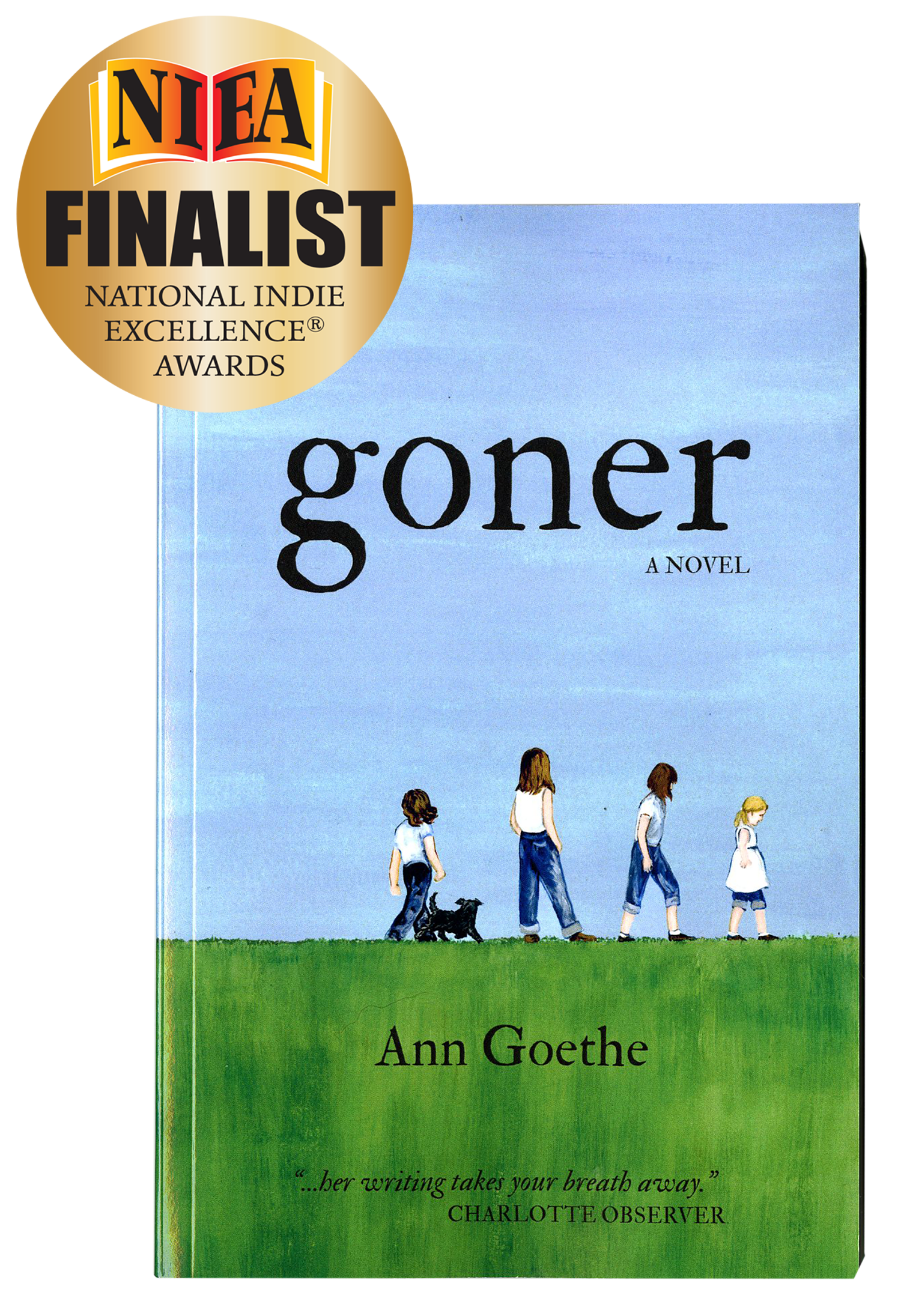goner
Goner follows the lives of four sisters from a progressive household in the Deep South. The narrative begins with their northern mother's arrival in a Louisiana army town as a young newspaper reporter in 1943 and her hasty, unconsidered, marriage to a genteel older man. It follows the naive couple from their disastrous wedding night, to the birth of their first daughter on the same day their house is reclaimed by a returning G.I. The Sobrals migrate from Baton Rouge, to an isolated bayou plantation, and then on to a cotton town caught in the post war boom. Just before their fourth daughter is born, the Sobrals settle in BelleBend, a sleepy little town on the Mississippi River.
The story follows the girls' childhood adventures--some hilarious and some breathtakingly dangerous--in a time and a place where adults pay little attention to the wanderings of children. Together, the Sobral daughters find Elvis, teen love, and come of age during the early civil rights movement. In their jasmine-scented isolation, the four sisters form a profound and enduring bond. Kennedy's assassination transforms their family in unforeseen ways.
In 1980 the four sisters return to their River Road house for their heartbroken father’s deathwatch. Their beloved and enigmatic mother has recently died. On their last night together, one of the sisters uncovers a devastating secret.
Goner examines the ties between real and imagined lives, between character and narrator, and the entwined ways that a family survives by creating its own myth.
praise for goner
"An articulate and stirring Southern story written from the heart." - Kirkus Reviews read more
"Reader’s will find that “Goner” will touch their souls; it is easy to read, and relatable to all, regardless of where one grew up. It is about family dynamics, turbulent relationships and things we wished we knew or said while our parents were alive. It will change one’s dynamics on how we want our children to remember us. Ann Goethe has given us a chance to re-assess our lives, how we live and treat others and how we want to be remembered. I often wonder if the secrets we as family members keep are worth it? I highly recommend “Goner” as it is thought-provoking and speaks to all of us." - Carol Hoyer for Reader Views (7/18) read more
"During a time of explosive race relations and Southern upheaval, a family consisting of four fiercely independent sisters, a devoted father, and a determined mother discover a form of salvation in their complicated love for each other. Inside Goethe’s lyrical depictions of Louisiana landscapes and America’s civil rights struggle, characters unearth each other’s secrets and reconcile themselves to each other’s eccentricities, passions, and failings. As the daughters’ narratives are inextricably interwoven with those of their seemingly ill-matched parents, the sisters decide which stories to tell and which stories are best forgotten. In her evocative novel Goner, Ann Goethe captures the stubborn, unquenchable love engendered by family—a love that endures because her characters dare to embrace difference." - Lucinda Roy, Author of Lady Moses
"I've been waiting a long time for the American novel to rise out of its Eliotonian "Wasteland" and search for the redemption of the past in its faith in the future. I've read few novels that pursue that theme as well as this one. The young people today are crying out for something positive to pursue, tired of America's long period of Nietzchean despair. So Congrats for leaving us with "curved concrete steps..." we can use to build upon for an America that has as much faith in each other as it does faith in the future of "vanquished dreams and untold stories."
This book is the REAL DEAL!!!!"
– Larson Bowker, author of Elegiac Dialogues
Amazon reviews from readers
"Goethe's writing compels you into the humid fragrant world of southern Louisiana where a beautiful Northern journalist finds herself fleeing a war time liaison into a marriage with an older kindly school principal. This marriage is the subject of much musing and investigation by the four daughters born of the unlikely union. A thoroughly engrossing read." Five stars.
"A real page turner! The reader is quickly invested in the lives of this family who become so real they float off the page. We learn racial history, family psychology, and the intricacies of the lives of women living in the South during the 50's. All this while being mightily entertained and piqued by a subtle mystery that makes us want to re-read the novel all over again." Five stars
"I was mesmerized by the author’s ability to weave multiple perspectives in time with this beautifully-told story. The rich details and accounts of these women’s lives made me feel like part of the Sobral family. A true celebration of SISTERHOOD and a must-read!" Five stars.
"While Goner purports to be about four sisters, it is really their mother’s story: a woman trapped in the middle class mores and morals of the Deep South in the 1950’s. This lyrical and evocative novel also questions the reliability of a “story’” told by one of its own characters. I loved it." Five stars
"This poignant story of growing up in the south has the aura of how fragile and yet resilient family relationships can be. The characters are complicated and so is the truth." Five stars
"Ann Goethe vividly conjures place, time and people - you can feel yourself sweating. The perspectives of the different generations of women are particularly acute - and anyone who has had turbulent relationships in their family (everyone?) will recognize the rivalries and mysteries that haunt them. I particularly was engrossed by the accidental marriage at the heart of this book - accidental because you really don't believe that the two are destined to have a "mutual" love affair. It feels both infuriatingly frustrating and heartbreaking while also pulling you into the stickiness that binds families together regardless of the circumstances around them. This is a perfect book for the beach." Five stars
"I loved this novel! The author created such a vivid image of time and place. I was transported to the Deep South during a time of immense change in our country. The descriptions of the land, the food, the events, and most of all, the people, left me feeling like I was part of the family. What a great story!!!! Five stars
"Mother moon, daughter stars, and earth bound sky guide: The subsequent reordering of the heavens cracked their galaxy apart." One of my favorite lines by an incredibley (sic) gifted author in her hard-to-put down novel that had me drinking whiskey sours and feeling as if I were the fifth Sobral sister." Five stars
"Moving portrayal of the painful coexistence of tenderness, love and loss within families. The writing is gentle yet precise and most touching in the passages that run a brushstroke over flashbulbs of the everyday (from morning coffee to child's play) with the nostalgia of a kodak slideshow that flickers on the page but is magnified into flesh, blood, smells and colour. A joy!" Five stars
"Ann Goethe has done it again! I've waited and waited for another novel from her and Goner is everything I hoped it would be and More! Goethe's writing is rich with southern humor, family tension, danger, and love ... what more could a reader want?" Five stars
"Loved all the sequences about Louisiana children growing up with siblings and landscape and townsfolk and such polar opposite parents in the 50s and 60s. The author aptly captured the malaise of 50s wives, through the one wife in particular, in a beautiful and sad and infuriating and accurate way.
And I appreciated the framing of the book as "story" in multiple references - a very particular story (all of us have one) because "memory" is so very fluid a resource." Four stars
"Mesmerized: I was! Mothers. Sisters. Made differently and relating somehow, like most of us do." Four stars
passages from the novel...
from chapter 1
These eager soldiers were no different than her father had been when he left for the “war to end all wars.” He had been one more bright, optimistic farm boy off to see the world and to defend innocent women and children from the evil Hun. He had returned home a different person, dark. Was Margaret’s father really the only dad who talked to his children about the last war? His stories of a comrade’s skull top sheared off, brains exposed like a bowl of cereal, and of another soldier trying to pack his own intestines back into his shattered torso were illustrations in Margaret’s childhood nightmares. Didn’t these boys—waving to get her attention, extending their clammy hands for rum Cokes and beer--know about the mud and gore, the boredom and horror? If they knew the stories, then they probably thought that this time would be different. Naturally, each generation thinks it is unique, and so the wheels keep turning. Boys go off to war, expecting to return as full men, brides ascend the altar sure they will be happier than their mothers—who had expected the same.
from chapter 6
Snow was falling. Already a thin layer of white covered the automobiles, the streets, trees and bushes. Shouts and laughter greeted the miracle; members of the congregation were standing in front of the church with their heads tilted, feeling the strange soft sting of snow on their faces. Matthew held tightly to Margaret’s arm and turned to watch that the Monroes, who were holding Rebecca, were taking care on the slick steps. Several people had already slipped. Children raced down the snowy sidewalk in front of the church, sliding on purpose, falling and rolling in their Sunday best, covering themselves in snow. They tried to make snowballs from the fluffy wet snow, scraping it from car hoods and the grass; as if they were play actors in a movie starring northern children. The flat featureless town looked like the Christmas window of a big department store. The adults were turning in slow circles, shouting and pointing, calling out to their children who were deafened by the muffled silvery spell of snow. Margaret and Matthew were probably the only people in the exultant crowd who had ever witnessed a real snowfall. Matthew was laughing and proud, as though the snow were part of his plan for the celebration of his new daughter. Margaret watched the impromptu carnival and imagined describing it to her Wisconsin friends, such delirium over snow.
from chapter 9
On some summer evenings as the sun dipped and diminished into the far off glitter of rice fields and the chorus of frogs began to clamor in the levee ponds, a thin dark complexioned man would slowly peddle his bicycle down the River Road, ringing the bell on his handle bars with his thumb. A big brightly colored box was braced on the front wheel of his bike.
“Popsicle Man! Popsicle Man!” The first of the girls to hear the bell would call out.
The girls were not allowed popsicles every time the Popsicle Man came down the River Road, but sometimes they were. On those delicious popsicle nights, Emily, Rebecca and Kate sat out on the front steps in their underpants, each holding a popsicle half. As soon as their mother peeled back the white paper and divided them, the popsicles began to melt. Matthew and Margaret would settle behind the girls, sitting in the swing on the screened porch, sharing the fourth half with the baby. The little girls tried to make their treats last as long as possible, without wasting even a drop of the rapidly melting flavored ice. They licked at their knuckles and wrists, closed their lips over the final nub. When the last shred of ice was gone, they chewed on the wooden sticks. Fireflies began rising from the grass, the sky scattered stars above the levee, and the pecan trees disappeared into shadows. If only the night could be held off and the hard chore of summer sleep postponed:
“Get off my side, Rebecca!”
“I’m not on your side.” Rebecca pressed her back against Emily.
“Off! It’s too hot.”
Whine, whine, whine, whine….
They slapped at the mosquito, or the mosquitoes, hovering at their ears. Emily and Rebecca had already peeled off their clammy nightgowns; their sheets were damp with sweat, tangled with little girl sleeplessness. Whine, whine, whine…. No matter how many times they slammed their palms against their ears, the whining would not stop. They pulled the sheet over their heads until the heat was unbearable and kicked it off; then the mosquitoes were back. They’d been just outside the sheet, waiting: Whine, whine, whine….
“You are too on my side!”
“You’re gonna wake up Mama,” Rebecca warned.
Whine, whine, whine….
from chapter 9
“I talked with the sheriff twice, Del. He said we needed a witness, a—"
“I seen it, Mr. Matthew,” she looked up from wiping her eyes. “A dark blue Ford. White man driving. I seen it. Hit her with that car and kept on. Come fast and left fast. I right there. Two steps back a Tee. I seen it.“
“He said a ‘reliable witness,’ Del.” Margaret angrily stubbed her cigarette into the ashtray. “He meant a white witness,” her voice broke. Overwhelmed with equal measures of anger and grief, she could hardly speak. “That Neanderthal said ‘colored people couldn’t tell white people apart, just like all colored people look alike to white people.‘ Only…” she took a deep breath and glanced at Matthew for verification. “Only that piece of ignorant garbage mouth probably didn’t use the word colored.”
“Del, are you?” Kate insisted. “Are you a man, or a girl?”
“Kate, get out this kitchen right this god damned minute!” Margaret snapped.
“But, Mama, I just…”
Margaret grabbed Kate’s skinny little arm hard and pushed her toward the back porch.
“I right there, screaming out for somebody to help us. Earnest Hawkes come running. He call the ambulance and it don’t come, it don’t come.” Delilah tried to catch her breath. “Time that ambulance come she be gone. Tee all I got in this world and she gone. “ Del covered her face with her hands and howled into the handkerchief.
Kate leaned anxiously in the doorway between the porch and kitchen, bewildered to see a grown man crying like a girl, trying to understand that Tee wouldn’t be back. What did that mean? How could she not come back? With everyone so sad, maybe she would. Maybe Tee would come back once she knew how sad her being gone made everybody. Kate rubbed her arm where her mother had grabbed her.
“I talked to Leroy at the funeral home, Del,” Matthew raised his voice, hoping the distraught woman could hear him. He patted her clumsily on the back. “We will pay all the expenses. Miss Sobral, the girls, and I will be at the funeral. You come on back to town with me and we’ll go pick out a nice coffin. Something Tee would like.”
“Tee all I got,” Del moaned and lowered herself down to her heels, rocking back and forth on the kitchen floor, holding onto her ribs. Then she began shouting, “All I got. All I got!”
Kate covered her ears and ran across the porch and out the door. She would go find her big sisters. They would know what to do.









